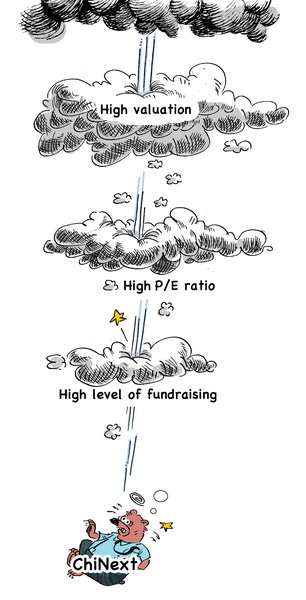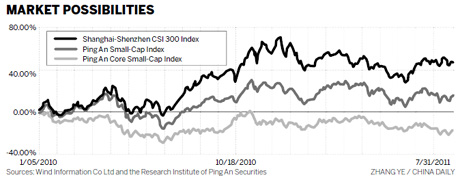Where next for the ChiNext?
Updated: 2011-09-28 09:14
By Gao Changxin (China Daily)
|
|||||||||||
As for investors, Liu said that only a few actually believe that the board's high valuations are reasonable and most of them buy the stock simply for short-term speculation.
"A lot of investors know that many companies on the board are overvalued, but no one seems to believe that the bubble will burst in their own hands," said Liu.
"They are not buying the companies for their potential, they just hope that they can buy the stock, wait for it to go up a little and then sell it."
Zero2IPO's Lei said the timing of the board's launch, when market liquidity was ample and other investment channels were lacking, also helped to prompt investors' passion.
"The sluggish performance of the main board and the government's tightening measures on real estate have narrowed investment channels. And so when the ChiNext came along, many investors thought it would be a good place to put their money," Lei said.
 |
"The investors have realized that many companies are over-valued and risky, so they will be cautious in the future when investing on the board," he said.
According to Wind Information Co Ltd, a Shanghai-based provider of financial data, 10 of the 26 new stocks on the ChiNext fell below their offer price in first-day trading in May.
In the first 20 days of June, five of the 16 new stocks also stumbled on debut.
"Going forward, the board has further room for adjustment, I think a price-to-earnings ratio of about 30 is a reasonable level for the board," Wang said.
"The price-to-earnings level of 80 won't be seen again in the future, (because) the board has been gradually moving from overheating to rationality."
As global economic uncertainties develop, especially in the light of the worsening European sovereign debt crisis, domestic stock markets have become volatile and have dropped continually during recent months.
As a result, the ChiNext dropped by 1.68 percent to close at 829.35 on Monday, after rising to 960.15 in late August from its June low.
China's small-capitalization stocks may extend their declines given the global economic outlook, analysts said. A ChiNext index of start-up companies has tumbled 21 percent this year on concern that monetary tightening will make it more difficult for small companies to borrow from banks and expand businesses.
"Small caps don't weather the downturn as well as their larger counterparts and the outlook for them is very challenging," said Christie Ju, head of Hong Kong and China Research at Jefferies Group Inc.
"China's going to pay for structural changes to its economy as it moves from a model that's export-driven to one more driven by domestic consumption," she said. "This is probably a time that's extremely challenging for the global economy."
Recently, the International Monetary Fund trimmed the estimate for China's year-on-year GDP growth to 9.5 percent this year from 9.6 percent. Meanwhile, the estimate for growth for 2012 was cut to 9 percent from a previous forecast of 9.5 percent in June.
Bloomberg News contributed to this story.

Related Stories
ChiNext Index closes higher - Sept 27 2011-09-27 16:37
ChiNext Index closes down -- Sept 26 2011-09-26 17:10
ChiNext Index closes down - Sept 23 2011-09-23 16:42
ChiNext Index closes down - Sept 22 2011-09-22 16:40
- Chinese businesses want a wider door to the US
- Imported iron ore supplies decline in China
- Legend bulks up to get ready for listing
- Trade zone projects on border 'going well'
- Liquor makers ordered to stabilize prices
- China's auto exports surge 53.3% in Jan-July
- China propels Huawei's sales
- Where next for the ChiNext?













